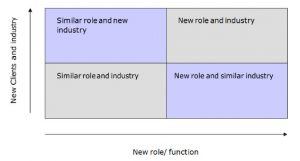The average job duration for younger workers of 2.5 years doesn’t take into account the in-job shifts in responsibilities and role.
In this context, many of us are starting to realise that doing the same as everyone else won’t work to advance a career. I sometimes tease my corporate lawyer friends that they put themselves in an environment with the most ambitious, competitive individuals in the least creative industry. It’s the worst combination to stall career development. Why? Because they can’t add unique value. When you feel like you’re not growing in your current role and there aren’t project and opportunities on the horizon, then it’s time to move on before getting overtaken by the rest.
There are more sectors, industries, niches and boutique companies than ever to explore your best match. That’s not to mention the range of employers from start-ups to sustainability to corporate—the variety is incredible.
The 21st century offers more opportunities than ever to develop your career with a move to complementary roles and industries to increase your salary. It’s done when you leverage your career capital—your most valuable experience, skills, and knowledge to make a natural change in role and/or industry. It’s more important than ever to design your career move to create opportunities that are at the same time exciting for you, attractive to potential employers and feasible with the time and money you have to make it happen. Opportunities around your unique value don’t happen, you create them.
Find Similar Roles for Smart Career Development
You will only outperform others when you excel in this particular area. Forget about your job title. Instead, look for career capital. This is an involved process that requires an objective appraisal and an understanding of the marketplace from the right experts. A good starting point is these resources where you might strike gold or at least expand your understanding of the possibilities.
My Skills myFuture can help find the movies that others have made leveraging what you have in common. Also, try O-NET skills search and widen your career options based on your top skills.
Then you can use an advanced LinkedIn search to find out who hires candidates with your skills. Use the keywords field to search for the specific skills you’re hoping to use in your next role. You can also enter the name of your degree here, as the search function doesn’t have a field for this purpose.
Develop Your Career in a Related Industry
There will be some complementary industries where others from your industry have already shown the value they can offer.
First, think about the clients and supply chain of your organisation and the industry more widely. You will find overlaps of knowledge, experience, and networks to help your shift.
Think about what your sector does well and what makes you stand out to other industries. With reduced government funding and the need for income generation in the nonprofit sector, many clients have made successful moves with their strategic planning, entrepreneurial concepts, technology or business development skills. The entertainment industry background of another client was very attractive to a number of technology companies, which are focusing more on content.
Use a Career Design Framework to Explore
Throughout your exploration, focus your mind on these key areas to identify where your strengths can solve the problems of others. Find:
● Industry trends that can work in your favor
● Insights and advice from experts or people that have transitioned successfully
● Resources that can serve you to find the information and build the skills you need
● Projects where you would be able to add value
Create a system and know what you’re looking for.
Then create a list of your roles/functions and industries and block them on a two-by-two matrix like this. Then reflect on the value you can offer and the opportunities worth exploring further.

With a solid process to follow, you’ll save time, yet it will still be a lot of work. However, compared to staying miserable in your current job or making a big leap that you’ll regret in two years’ time, it is completely worth it. Remember, opportunities don’t just happen—you create them by taking practical steps towards career development.
I’m also offering a step-by-step process to create new career ideas for you by following this link
This is a Contributor Post. Opinions expressed here are opinions of the Contributor. Influencive does not endorse or review brands mentioned; does not and cannot investigate relationships with brands, products, and people mentioned and is up to the Contributor to disclose. Contributors, amongst other accounts and articles may be professional fee-based.

